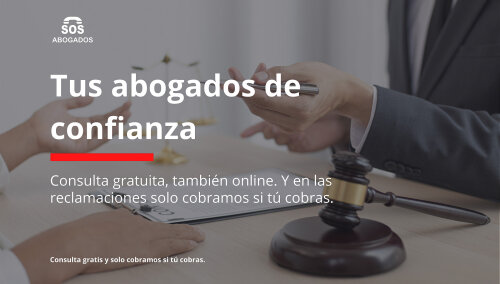Best Child Custody Lawyers in Salamanca
Share your needs with us, get contacted by law firms.
Free. Takes 2 min.
Free Guide to Hiring a Family Lawyer
List of the best lawyers in Salamanca, Spain
Spain Child Custody Legal Questions answered by Lawyers
Browse our 1 legal question about Child Custody in Spain and read the lawyer answers, or ask your own questions for free.
- child care
- My brother has a problem taking his kids for education as his ex-live-in partner doesn't allow him, we only want to send them to school, and during sem break, we can send them back to her.
-
Lawyer answer by RI & Associates
Do you have children custody? This can be done through the permission of the court. If he does not follow the court orders then he can be arrested.
Read full answer
About Child Custody Law in Salamanca, Spain
Child custody in Salamanca, Spain, governs the legal and practical relationship between parents and their children after separation or divorce. Known in Spanish law as "custodia" or "guarda y custodia," these laws determine which parent is responsible for the care, upbringing, and daily decisions of the child. Salamanca, as a part of the Castilla y León region, follows Spanish national legislation on child custody, primarily set out in the Civil Code. The primary goal of these laws is to protect the welfare and best interests of the child, ensuring their physical, emotional, and educational needs are met.
Why You May Need a Lawyer
Seeking legal advice in child custody matters is often crucial for parents facing complex situations. You may need a lawyer if:
- You and your partner cannot agree on custody arrangements or visitation schedules.
- There are concerns about the child’s safety, well-being, or welfare.
- You want to modify an existing custody agreement due to changes in your circumstances.
- The other parent plans to move to a different city or country with the child.
- You face accusations or legal challenges from the other parent.
- You are uncertain about your legal rights or obligations under Spanish law.
Legal professionals can help negotiate agreements, represent you in court, and ensure your and your child's rights are protected throughout the process.
Local Laws Overview
Child custody in Salamanca operates under the framework of Spanish Civil Code. The following are particularly relevant aspects:
- Types of Custody: Spanish law recognizes sole custody (one parent has full responsibility) and joint custody (both parents share responsibilities).
- Best Interests of the Child: The court’s primary focus is the child’s well-being, including emotional, educational, and social needs.
- Parental Agreement: Courts encourage parents to reach mutual agreements. If not possible, a judge will decide.
- Visitation Rights: Unless there are exceptional circumstances, the non-custodial parent is usually granted visitation rights.
- Modification: Custody terms can be changed if circumstances alter significantly, such as changes in employment, residence, or child’s needs.
- Influence of Age: Children 12 years or older may be consulted by the judge regarding their wishes.
- International Aspects: Different rules apply if one parent lives outside Spain or attempts to relocate with the child abroad.
Understanding these laws is vital for both parents to ensure their actions align with legal requirements and children’s best interests.
Frequently Asked Questions
What is the difference between sole and joint custody in Salamanca?
Sole custody gives one parent primary responsibility for the child’s care, while joint custody allows both parents to share these responsibilities, often splitting the child’s time between both households.
How is custody decided if parents cannot agree?
If parents cannot reach an agreement, a judge will decide after considering factors such as the child’s best interests, each parent’s situation, and the child’s wishes if they are over 12.
Can grandparents or other relatives receive custody?
In rare cases, if both parents are unable to provide care, the court may grant custody to grandparents or other close relatives in the child’s best interests.
What factors influence the judge’s custody decision?
The court considers the child’s emotional and physical needs, each parent’s ability to provide care, the child’s relationship with each parent, and stability of homes and education.
Can I move to another city or country with my child after custody is established?
Relocating requires the consent of the other parent or a court order. Unauthorized relocation can have serious legal consequences.
How does the court handle cases involving domestic violence?
If there is a history of abuse or violence, the court prioritizes protecting the child and the affected parent, potentially restricting the abusive parent’s custody or visitation rights.
Is mediation required before going to court?
While not always mandatory, mediation is encouraged to help parents reach a mutually agreeable solution before a judge intervenes.
Can custody agreements be changed after the divorce?
Yes, custody arrangements can be modified if there are significant changes in either parent’s or child’s circumstances.
Do children have a say in custody decisions?
Children aged 12 and above are generally heard by the judge, who will consider their preferences along with other factors.
What happens if a parent does not comply with the custody agreement?
Non-compliance can result in legal penalties, including fines, loss of visitation, or changes in custody arrangements. The affected parent can apply to the court for enforcement.
Additional Resources
If you need more information or support regarding child custody in Salamanca, consider the following resources:
- Ilustre Colegio de Abogados de Salamanca: Local bar association offering lawyer listings and initial guidance.
- Juzgados de Familia (Family Courts): Salamanca's family courts handle custody disputes and provide procedural information.
- Servicio de Orientación Jurídica: Legal orientation service, often available at local courts, provides free initial advice.
- Instituto de la Mujer: Supports mothers and children, particularly in cases involving violence or vulnerability.
- Centro de Mediación Familiar: Family mediation centers help parents negotiate custody arrangements.
Next Steps
If you require legal help regarding child custody in Salamanca:
- Consider scheduling a consultation with a local family law attorney who specializes in child custody cases.
- Bring relevant documents such as marriage or partnership certificates, previous court orders, and information about your child’s needs.
- If your situation is urgent, such as cases of violence or child endangerment, report immediately to authorities or seek protective measures from the courts.
- Utilize free legal aid services if you have limited financial resources.
- Stay informed and remain engaged in your case to ensure the best possible outcome for your child.
Taking these steps will ensure you are well prepared to protect your rights and the welfare of your child throughout the custody process.
Lawzana helps you find the best lawyers and law firms in Salamanca through a curated and pre-screened list of qualified legal professionals. Our platform offers rankings and detailed profiles of attorneys and law firms, allowing you to compare based on practice areas, including Child Custody, experience, and client feedback.
Each profile includes a description of the firm's areas of practice, client reviews, team members and partners, year of establishment, spoken languages, office locations, contact information, social media presence, and any published articles or resources. Most firms on our platform speak English and are experienced in both local and international legal matters.
Get a quote from top-rated law firms in Salamanca, Spain — quickly, securely, and without unnecessary hassle.
Disclaimer:
The information provided on this page is for general informational purposes only and does not constitute legal advice. While we strive to ensure the accuracy and relevance of the content, legal information may change over time, and interpretations of the law can vary. You should always consult with a qualified legal professional for advice specific to your situation.
We disclaim all liability for actions taken or not taken based on the content of this page. If you believe any information is incorrect or outdated, please contact us, and we will review and update it where appropriate.














